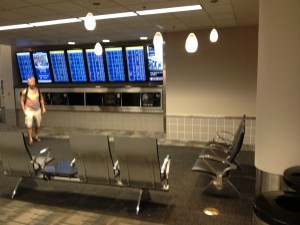Losing Travelers Between Flights: Fliers with Special Needs and Elderly Airline Passengers

“Lost at the airport.” These are words that no parent wants to hear. But those with a family member with special needs who call the airports and airlines looking for a little flexibility may find they cannot get a pass to meet their loved ones on the other side of the TSA screening area. Families who call to see if they can escort their disabled loved ones are assured that there was no chance that such a traveler would get lost. But that is precisely what happens.
Christopher Elliott did an excellent piece on this topic entitled “Unfriendly skies,” that I came across in the St. Paul Pioneer Press (TwinCities.com) on July 20th, when I was in the area for the US DUathlon National Championships. The airlines’ position is that anyone who is unable to understand or act appropriately because of a mental disability on a flight or during the airline travel experience should should travel with an assistant. If an air traveler cannot adequately function or respond to flight crews’ instructions, then they should fly with an escort. However, the expense of a care giver can be prohibitive to many families.
Our own family experienced a very similar problem when we paid for elderly, infirm family members to fly across the country with their regular caregiver. A week after the tickets were paid for, the home aid quit. When we tried to change the names on the assistant’s ticket to the new health aid, the airlines would not allow us to do so. We explained that the 90-year-old war veteran and his wife of 73 years were incapable of traveling alone and that we were simply changing the name to reflect the new reality. United Airlines would not be flexible, and we had to purchase a whole new ticket. The disabled and those with special needs should be able to travel on our national airlines. Just as with “unescorted minors,” the airlines should have standard operating procedures for accommodating those who, because of age, disability, limited mental capacity, have special needs.
